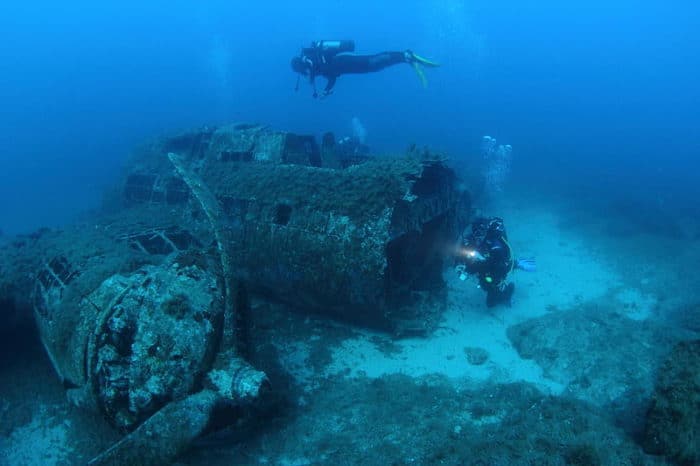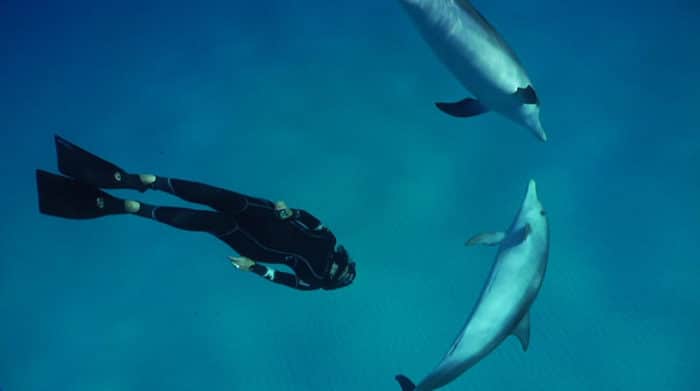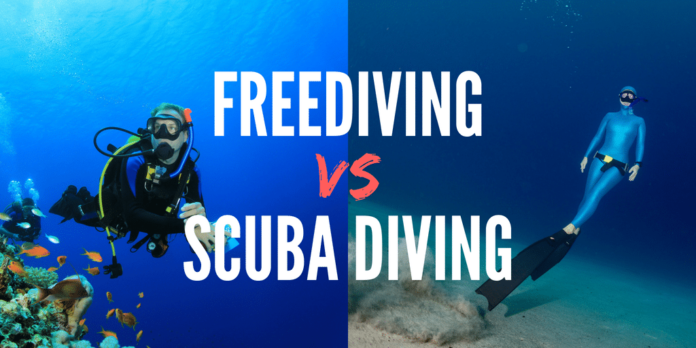Freediving and scuba diving sometimes seem like they are two teams that are battling it out against each other, but really, they are just two completely different ways to enjoy the ocean. There are a lot of key differences between the two activities, but also a few similarities as well. Personally, I was a PADI Divemaster before I discovered freediving, so I have had experience in both types of diving and prefer one or the other in different diving destinations and situations. First, let us take a look at the main differences.
Differences
Recreational Diving

Whether you like to explore wrecks, corals, or just glide alongside marine life, there are different situations in which freediving or scuba diving might be more beneficial for the dive. If there is a wreck or a dive site that is located only 15m (49ft) or less below the surface, freediving may be more favorable as it is shallow enough to dive multiple times, float above pretty corals, and follow marine life around even if they are ascending or descending.
Bubbles that come from a scuba diver’s regulator will usually disturb marine life, but meet a fish as a freediver will just make you a big, unknown fish to them, and they will not swim away and hide as often as they do with scuba divers. Freediving with marine life will often give you a more personal experience with aquatic creatures than scuba diving with them.
On the other hand, if there is marine life at depth, where you have to wait for them to appear, it will be more useful to scuba dive the area instead. Thresher sharks in Malapascua, Philippines are located near a cleaning station 30m (98ft) below the surface, and diving down continuously may scare the more apprehensive sharks away, while scuba divers can kneel peacefully and quietly and wait for them to appear, and have more time to observe them.
For freedivers, deeper depths also means greater oxygen consumption just arriving at that depth and very limited bottom time. It can be exhausting doing multiple dives and will give you far less time exploring than scuba diving would allow. In these situations, scuba diving would be more beneficial.
Training
After a certain point in recreational scuba diving, you will hit a limit. You can improve your safety skills, air consumption, and other skills such as buoyancy, but you can go no deeper than 40m (131ft) on air ethically without committing to technical diving. Tech diving is incredibly cool, but can also be incredibly expensive, not just for the certification, but also for the dives themselves. If you do not have the money or the time to invest in that or other scuba specialties and live or dive in the same dive sites all the time, then scuba diving can become a bit repetitive.
Limits regarding freediving have yet to be discovered. New national and world records are still being reached, and personal limits can always be improved. There are many different disciplines to dip your toes into, and there is always room to improve. Overcoming your fears, challenging yourself, and achieving new personal bests feels fantastic, and it never has to stop with freediving. Freediving training does not require a dive site to be rife with beautiful corals or teeming with loads of marine life (although no freediver will say no to that, either); as long as there are good conditions, you can never get bored.
Equipment

There are maintenance and costs required in both freediving and scuba diving equipment, but you cannot scuba dive without equipment. Since reliance on equipment is of the utmost importance in scuba diving, it adds a factor to your dives that you might not have any control over. If you are renting equipment from a shop, you have to trust that the equipment is well taken care of, and some types of equipment failure can be unexpected, even with perfect maintenance. On the other hand, you can technically freedive without any equipment, but of course, it is helpful to have certain equipment depending on the water conditions or what disciplines you are practicing. But less reliance on equipment takes away a stress factor for freedivers, who rely more on their experience, personal limits, intuition, and other factors.
Similarities
Safety is a huge factor in both freediving and scuba diving. Neither should be done alone, and both sports should be discovered and taught under a professional, experienced instructor. Both freedivers and scuba divers should take internationally recognized courses from reputable agencies, repeat safety training often, and stay up to date regarding new information and developments in their respective areas. Both sports require confidence in the water, stress management skills, and recognizing your limits. Freediving and scuba diving create ocean advocates out of students and highlight the damages that are being done to the sea and how we can help sustain our aquatic environment.
Neither scuba diving nor freediving is better than the other. Both sports have their advantages and disadvantages, whether it is to spend more time exploring caves and surveying a deep wreck or to interact with aquatic life more organically and check out corals and walls at shallower depths. Each is better for someone in their own way, and neither has to be more generally preferable than the other. The most important factors regarding both sports that everyone can agree on are to never scuba dive or freedive alone, always keep safety as a priority, and to respect our oceans while raising awareness.

